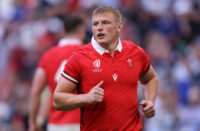 Is it a coincidence that Premiership teams appear to be playing a more expansive game this season, or that the same is true of the teams who have won the World Cup, and the main Northern and Southern Hemisphere trophies over the last 12 months?
Is it a coincidence that Premiership teams appear to be playing a more expansive game this season, or that the same is true of the teams who have won the World Cup, and the main Northern and Southern Hemisphere trophies over the last 12 months?
The world champions, New Zealand, have shown the way, and the Queensland Reds, Waikato Chiefs, Leinster and Harlequins all play with an attacking attitude rather than a negative kick-chase-defend policy.
It’s about time that Premiership clubs cottoned on to how the game should be played, and supporters are seeing the benefits in the number of tries that are being scored in the opening few weeks. It seems that a combination of the example set by winning teams, and a Law tweak – meaning no ball hanging around at the back of a breakdown – has meant a more attack-minded game.
It’s an important shift because Premiership coaches could be accused of short-changing their playing rosters and supporters for too long. The development of the game in England has been stagnant for several years, and that’s partly due to relegation and having to win the easiest and simplest way. It’s easy to coach that stuff. You need specific players to do the job: Big to get over the gainline, strong to arm-wrestle in the forwards, and not too much stamina because of the seven or eight subs you can use.
It is a boring approach in which individual skill development and decision- making did not appear to be coached by the majority of Premiership teams.This has been reflected in how the England team plays. It will take a while to get those skills back unless Premiership teams continue with their current attitude – or a crop of inspirational young players appear who tell coaches how the game should be played.
I’ve been spoilt recently watching the All Blacks compete in the new Rugby Championship. New Zealand have beaten Australia twice – the second time they nilled them – Argentina once and Sotuh Africa once. The rugby played by these NZ guys is the game at its best and most testing.
To play the way the All Blacks do players have to have a very high level of anaerobic fitness, along with core strength, and a wealth of skill and technique. Most of the New Zealand players have skills and technique that are at unbelievably high levels compared to the rest of world rugby, mainly because of the way they have been coached from a young age. This results in the decisions they make under the severe pressure of a Test match usually being the right ones.
Look at the New Zealand pack, and, apart from Richie McCaw and Kieran Read, the rest don’t strike me as unbelievable world class players – yet they can deal with pretty much any other international pack in the set-piece.
Move into open field, where a lot of forwards feel really uncomfortable, and that’s when you see the difference. In lots of cases the All Black forwards handle as well as their backs. It’s frightening how much better New Zealand are in this area compared to the rest of world rugby, and worrying that it is taking other countries so long to close the gap.
What the rest of world rugby hasn’t yet grasped is how to measure skill, but I believe that New Zealand see a rugby player’s skill and ability first rather than his power and strength. I’ve heard stories of young lads in England being told they are unlikely to make the grade in rugby because they aren’t strong enough or big enough. There’s nothing more ridiculous or damaging for the game than spouting that rubbish.
New Zealand will come unstuck from time to time, but the All Blacks believe rightly that their style will prevail in the long run over those who are just big and strong.
Sure, in a one-off match like the knock-out stages of a World Cup it can go horribly wrong. If there is one negative that could be put on the Kiwis it is that they don’t know when to stop trying to play. I watched them against Argentina, and, rather than trying to off-load and run the ball from deep, they needed to make some simple territorial gains from set-piece, and maybe knock a couple of penalties. Instead, they kept on trying to score from underneath their own posts.
It is pleasing to see the English teams adopting a more positive attacking approach, but it doesn’t mean it has to be that way all the time. We want intelligent play, and when the weather conditions worsen then the teams should play accordingly. But if a scoring situation arises, and the coaching of skills is pushed through the English game, then we will see those opportunities snapped up.
The best compliment you can give New Zealand right now is that from a small population their second team would give most of the other international teams a bloody good game.
You cannot say the same for England, despite them having the largest numbers participating.
One Comment
Leave a Comment
You must be logged in to post a comment.
























Pingback: blote tieten